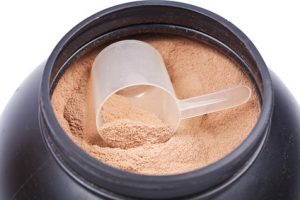Does whey protein really effect kidney? This is a commonly ask question when people are talking about fitness and weight loss. People with different idea keep arguing with each other. So what does whey protein actually do and how is that gonna affect our body?

chocolate whey isolate protein
General types of whey protein.
Whey protein is a mixture of beta-lactoglobulin, alpha lactalbumin, bovine serum albumin, and immunoglobins. There are three primary types of whey protein:
- Whey protein concentrate: WPC contains low level of fat and carbohydrates and some minerals. The concentration of protein is usually 25-98% (Typical level found in commercial products is ~80%)
- Whey protein isolate: WPI contains 90-95% of whey protein and only trace amount of fat, lactose and minerals.
- Whey protein hydrolysate: WPH, also called hydrolyzed whey, is the partially hydrolyzed whey protein which is much easier to be digested and absorbed than the other two. This type of products usually contains 80-90% proteins.
How does it work?
Protein is vital to our body function. It helps the cells grow and repair themselves, and compose much of the actual substance of human body. Human body can synthesize some protein itself from 12 amino acids produced itself. The other 9 amino acid must be gained from dietary protein and whey protein is one effective source which works in the same way as an egg or steak does. However, human body absorbs whey protein much faster than from daily foods.
The benefits!
- Weight loss: A study done in 2008 published in Nutrition & Metabolism evaluated the whey protein for use as a dietary supplement to enhance weight loss. The result shows that the group which is given whey protein lost significantly more body fat than the group consuming control beverage.
- Reducing cholesterol level: A study done by Sebely, Vanessa and Satvinder supplied 70 overweight men and women with whey protein for 12 weeks and measured the lipid and insulin levels regularly. They found that there was a significant decline in total cholesterol and LDL cholesterol comparing to the control group.
- Lowering blood pressure and reducing the risk of cardiovascular disease: A research done by Susan et al. shows that whey beverages significantly reduced blood pressure in patients with hypertension and also their risk of getting heart disease was also lowered.
Any negative effect?
Whey protein is derived from milk so people who are allergic to milk may also be allergic to whey. Usually, whey protein doesn’t cause any health problem except for excessive consumption. It will cause stomach pains, nausea, headache and so on. When too much whey is consumed, the kidney faces a big challenge of excreting the waste and may cause impaired function of kidney. A moderate amount of whey intake is 0.8 grams per kilogram of body weight.
Back to the question: Does whey protein really effect kidney? The answer is Yes and No. Moderate consumption of whey protein along with resistance exercise will not cause any healthy issue and will help muscle building and metabolism. However, overdoes of whey protein will definitely cause kidney problem like kidney stones.
Written by Xuan Wang

4 responses to “Does whey protein really effect kidney?”